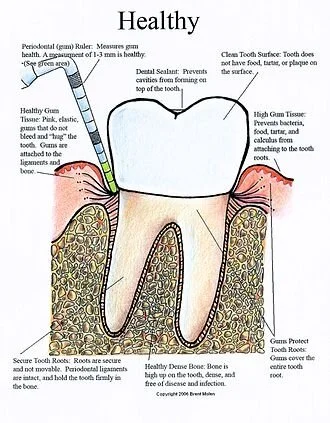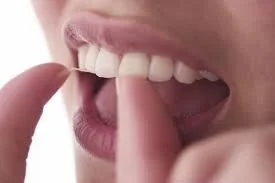How to Deal with Periodontal Disease
(AKA Gum Disease)
What does the word “periodontal “ mean?
The word periodontal is Latin in origin. ”Perio” means around, and “dentus” means tooth, so “periodontal” literally means around the tooth. The periodontium represents all the structures surrounding the tooth, which attach the tooth to the jaw. The disease of the periodontium is called gingivitis or periodontitis depending on the severity.
Photo taken by Jonas Bergsten
The periodontium is an intricate system, composed of the following:
The gingiva (or gums) which is much more than the pink flesh that you see in your mouth. It acts as a cover for the entire periodontium, and contains fibers, ligaments and cells that contribute to the health of the teeth and bone;
The bone, meaning the bone of the jaw;
The periodontal ligament, which is a very delicate array of fibers, that attach the tooth to the bone.
Periodontal disease is the second most common cause of dental pain and tooth loss, after dental decay. The problems that can affect the periodontium are numerous and range from simple bleeding of the gums, to severe tooth pain, to mobility which can actually cause the loss of your tooth.
Almost all periodontal diseases arise from poor oral hygiene and failure of the patient to take proper care of his oral health.They start with build-up of food remnants (called plaque) which after that hardens and becomes calculus (or tartar).This calculus replaces the healthy tissues of the periodontium (the gums and the periodontal ligament) and is loaded with bacteria which spreads throughout the periodontium.
What does periodontal disease look like?
Periodontal disease initially starts with bleeding of your gums, usually during brushing, which indicates a fault in the way you brush your teeth. If ignored, the gums recede and pull away from the tooth, exposing the root which is a very sensitive part. At this point you will start feeling sensitivity to hot and cold foods and drinks. This recession can become so severe that the entire root could be exposed. The most severe form of periodontal disease is when your tooth starts to move and become mobile. This means that the bone and the periodontal ligament are beginning to fade, so there is nothing to hold the tooth in place. If the mobility becomes severe, the tooth will need to be extracted.
How to avoid periodontal disease:
Take good care of your teeth by brushing and flossing on schedule or you will probably suffer some form of periodontal disease. Some people are predisposed genetically to periodontal disease, like people who suffer from diabetes or have crooked teeth so much that they can’t maintain proper oral care. These cases need extra care of their oral health and regular visits to the dentist will help with that.
Another common cause of periodontal disease is faulty tooth brushing. If you use a very hard or very old and bristled toothbrush, or brush in a very aggressive way, you could damage your gums. Seek the help of your dentist or hygienist to show you how to properly brush your teeth.
The most important thing you need to know is that periodontal disease is very easily avoidable if you just take good care of your teeth and visit your dentist at regular intervals, and that it can be very difficult to treat if they reach an advanced state. So, see your dentist for a checkup once every 6 months.
If you need a gentle, caring dental team, please call Jennifer Fineberg’s office at (623) 362-2550. We’ll give you the very best dental care we can!


